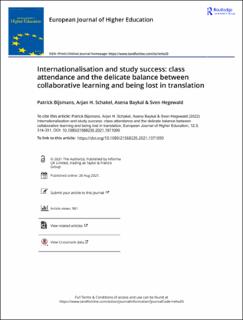Internationalisation and study success: Class attendance and the delicate balance between collaborative learning and being lost in translation
Journal article, Peer reviewed
Published version

Åpne
Permanent lenke
https://hdl.handle.net/11250/3050716Utgivelsesdato
2022Metadata
Vis full innførselSamlinger
Originalversjon
European Journal of Higher Education. 2022, 12 (3), 314-331. 10.1080/21568235.2021.1971099Sammendrag
The internationalisation of Higher Education is broadly seen as a positive development. It is a process that is said to contribute to intercultural skills acquisition, which is deemed crucial in today’s globalised society. Yet, research has shown that the benefits of being confronted with other ideas and viewpoints can get lost in translation due to different languages and academic cultures. We set out to explore the impact of the international classroom on study success and argue that there might be an optimum level of internationalisation. Based on a dataset that includes more than 2822 GPA scores for 836 students from four first-year cohorts of an international Bachelor in European Studies, we find strong empirical evidence that students’ study success is lower when there are few (below 3) or many (above 6) different nationalities in the classroom. We find the strongest effects of internationalisation for students who regularly attend class (i.e. 80–90%). Hence, we present strong evidence that internationalisation has a both a negative and a positive impact on students’ study success but students will only experience these beneficial and detrimental effects of learning in an international environment when they attend class.
